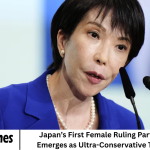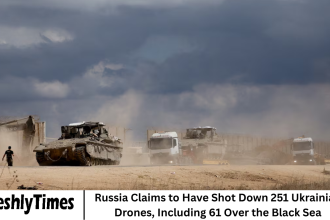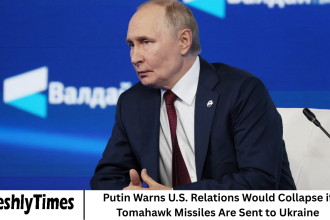Tensions between Iran and the international community have escalated once again following Tehran’s declaration that its cooperation with the International Atomic Energy Agency (IAEA) has become “irrelevant” in the wake of renewed Western sanctions.
- Background: The Long and Tense History of Iran–IAEA Relations
- The Announcement: “IAEA Cooperation Is Now Irrelevant”
- Renewed Sanctions: The Trigger for Iran’s Defiance
- International Reaction: Global Concern and Diplomatic Shockwaves
- Implications for the Nuclear Deal and Regional Stability
- Iran’s Domestic Politics: Nationalism and Resistance
- Possible Paths Forward: Diplomacy, Confrontation, or Stalemate
- Continued Defiance and Isolation:
- Conditional Cooperation:
- New Diplomatic Framework:
- Escalation and Confrontation:
- Gradual De-escalation:
- Frequently Asked Question
- Conclusion
The announcement, made by senior Iranian officials, underscores the growing hostility between Iran and Western powers, particularly the United States and European Union, as nuclear diplomacy continues to falter.
This development marks another critical turning point in Iran’s strained relationship with international nuclear watchdogs and raises concerns about the future of the 2015 Joint Comprehensive Plan of Action (JCPOA), commonly known as the Iran nuclear deal.
More Read: Japan’s First Female Ruling Party Leader Emerges as Ultra-Conservative Trailblazer
Background: The Long and Tense History of Iran–IAEA Relations
Iran’s relationship with the IAEA has been fraught with suspicion, negotiation, and confrontation for more than two decades. The IAEA, established in 1957, is tasked with promoting peaceful use of nuclear energy while preventing the proliferation of nuclear weapons.
Iran, as a signatory to the Treaty on the Non-Proliferation of Nuclear Weapons (NPT), has long claimed its nuclear program is intended solely for peaceful energy production.
However, since the early 2000s, Western nations—especially the United States and European Union members—have accused Tehran of secretly pursuing nuclear weapons capabilities.
This led to a series of UN sanctions, diplomatic stand-offs, and eventually the JCPOA in 2015. Under that deal, Iran agreed to curb its uranium enrichment and allow IAEA inspections in exchange for sanctions relief.
The 2018 withdrawal of the U.S. from the JCPOA under President Donald Trump shattered this fragile balance. Washington reimposed sweeping sanctions, targeting Iran’s energy exports, banking system, and key industrial sectors.
Iran, in response, gradually rolled back its nuclear commitments, enriching uranium beyond the limits set by the agreement and restricting IAEA access to certain facilities.
The situation has worsened since 2021, as talks to revive the nuclear deal have stalled and Western powers have tightened economic sanctions once again. Tehran’s latest declaration effectively signals that it no longer sees cooperation with the IAEA as beneficial or necessary under current conditions.
The Announcement: “IAEA Cooperation Is Now Irrelevant”
Iranian Foreign Ministry spokesperson Nasser Kanaani delivered a pointed statement during a press briefing, declaring that cooperation with the IAEA “has lost its meaning” due to the reinstatement of Western sanctions. According to Kanaani.
The IAEA’s independence has been “compromised by political pressure from hostile countries,” making Iran’s compliance efforts “futile.” He asserted that the IAEA’s recent resolutions criticizing Iran’s nuclear activities were “politically motivated and influenced by Western agendas.”
Kanaani further stated that until sanctions are lifted and Western countries “fulfill their obligations,” Iran sees no justification for continuing what it considers “unfair scrutiny.”
Iran’s Atomic Energy Organization (AEOI) also echoed the statement, accusing the agency of acting “unprofessionally” and disregarding Iran’s technical clarifications. The AEOI emphasized that Tehran remains committed to peaceful nuclear development but will not “tolerate double standards or coercive diplomacy.”
This rhetoric represents a dramatic shift from Iran’s earlier willingness to maintain limited cooperation with the IAEA, even amid tensions. Observers view it as an overt warning that Tehran may further curtail transparency over its nuclear program.
Renewed Sanctions: The Trigger for Iran’s Defiance
The renewed sanctions that prompted Iran’s defiant response are part of a broader Western strategy to pressure Tehran over its expanding nuclear activities and regional behavior.
In recent months, both the United States and the European Union have reimposed restrictions targeting Iran’s energy exports, defense industries, and financial networks. Washington has accused Iran of enriching uranium to levels approaching weapons-grade purity.
While also supplying drones and other military equipment to Russia for use in Ukraine—a claim Iran denies. The EU, meanwhile, cited “grave concerns” about Iran’s human rights record and its “continued destabilizing actions in the Middle East” as justification for its renewed punitive measures.
These sanctions have significantly strained Iran’s already fragile economy, devaluing its currency and intensifying inflation. Tehran’s leadership views the measures as an attempt to “strangle the nation into submission.”
As a result, officials have hardened their stance toward international agencies that they perceive as complicit in Western pressure campaigns.
International Reaction: Global Concern and Diplomatic Shockwaves
Iran’s decision to deem IAEA cooperation irrelevant has sent shockwaves through diplomatic circles. Western nations, the IAEA, and regional powers have all expressed alarm over the potential implications for nuclear monitoring and global stability.
The IAEA’s Response:
IAEA Director General Rafael Grossi expressed “serious concern” over Tehran’s statement, emphasizing that the agency’s work “is essential to ensuring transparency and trust.” Grossi reiterated that Iran has obligations under international law and that disengagement from the agency “would not serve its interests.”
United States Reaction:
A U.S. State Department spokesperson condemned Iran’s decision, calling it “deeply irresponsible and provocative.” Washington reaffirmed that sanctions would remain in place until Iran fully complies with its nuclear obligations and ceases activities “inconsistent with peaceful use.”
European Union Response:
The EU’s foreign policy chief, Josep Borrell, said the announcement “moves Iran further away from diplomatic resolution.” He warned that continued defiance could lead to “further isolation” and possibly referral of the issue to the UN Security Council.
Russia and China’s Stance:
Interestingly, Russia and China—both signatories of the JCPOA—urged restraint and dialogue. Moscow criticized the Western sanctions, saying they were “counterproductive and escalatory,” while Beijing called for a “balanced approach” that addresses both Iran’s economic concerns and nonproliferation commitments.
Implications for the Nuclear Deal and Regional Stability
Iran’s decision to abandon meaningful cooperation with the IAEA casts serious doubt on the future of the JCPOA. Without regular inspections and access to Iranian nuclear sites, the international community loses visibility into the scale and intent of Iran’s nuclear activities.
Analysts warn that this could accelerate a new phase of nuclear brinkmanship in the Middle East. If Iran continues to enrich uranium unchecked, regional rivals like Saudi Arabia and Israel may feel compelled to strengthen their own defense postures—or, in the worst case, pursue nuclear capabilities of their own.
Israel, long a vocal opponent of Iran’s nuclear ambitions, has vowed to “take all necessary measures” to prevent Tehran from obtaining a nuclear weapon. The Israeli Defense Forces (IDF) have reportedly intensified preparations for potential preemptive strikes on Iranian nuclear facilities if diplomacy collapses completely.
In the Gulf region, U.S. allies such as Saudi Arabia and the United Arab Emirates are deeply concerned about the possibility of renewed conflict and regional arms races. Meanwhile, the global energy market remains sensitive to geopolitical instability, with potential implications for oil prices and trade routes.
Iran’s Domestic Politics: Nationalism and Resistance
Iran’s declaration is not only a foreign policy move but also a domestic political signal. Facing growing public frustration over economic hardship, inflation, and unemployment, the Iranian leadership is framing resistance to Western pressure as a matter of national dignity and sovereignty.
President Ebrahim Raisi, a hardline cleric known for his anti-Western rhetoric, has consistently portrayed sanctions as “tools of oppression” and the IAEA as a “pawn of Western powers.” His administration seeks to project defiance and self-reliance, appealing to conservative factions and nationalist sentiment within Iran.
At the same time, critics inside the country warn that isolating Iran further could deepen economic suffering and limit opportunities for diplomatic engagement. Reformist politicians and civil society activists have called for renewed dialogue, arguing that confrontation will only entrench the regime’s hardliners.
Possible Paths Forward: Diplomacy, Confrontation, or Stalemate
Experts outline several potential scenarios following Iran’s announcement:
Continued Defiance and Isolation:
Iran may continue rejecting IAEA oversight and expand uranium enrichment, pushing the world closer to a crisis similar to pre-2015 levels of tension.
Conditional Cooperation:
Tehran might maintain minimal technical contact with the IAEA while using its stance as leverage in future negotiations. This could allow limited inspections under specific terms while demanding sanctions relief.
New Diplomatic Framework:
Regional or global powers, possibly led by China or Russia, could propose an alternative diplomatic mechanism to revive dialogue outside the JCPOA framework.
Escalation and Confrontation:
If Iran continues enrichment beyond 90% purity or restricts IAEA access entirely, Western powers could respond with new UN sanctions or even military threats.
Gradual De-escalation:
In a less likely scenario, backchannel diplomacy could quietly restore partial cooperation, allowing the IAEA to re-enter Iranian facilities while broader negotiations resume.
Frequently Asked Question
Why did Iran declare cooperation with the IAEA “irrelevant”?
Iran made the declaration after renewed Western sanctions, arguing that cooperation serves no purpose while its economy is being “unjustly targeted.” Officials claim the IAEA has lost neutrality and acts under Western influence.
What sanctions led to Iran’s latest move?
The United States and European Union reinstated sanctions targeting Iran’s energy exports, banking, and defense sectors due to its expanding nuclear program and alleged involvement in regional conflicts.
How has the IAEA responded to Iran’s statement?
The IAEA expressed serious concern, urging Iran to fulfill its legal obligations and resume cooperation. Director General Rafael Grossi emphasized that disengagement would undermine transparency.
What are the potential consequences of Iran’s decision?
Without IAEA monitoring, the international community loses visibility over Iran’s nuclear program, increasing fears of weaponization and regional instability.
Could this affect the 2015 nuclear deal (JCPOA)?
Yes. Iran’s stance severely undermines the JCPOA framework, as inspections and compliance verification are central to the deal’s survival.
How have global powers reacted?
The U.S. and EU condemned Iran’s move, while Russia and China called for restraint and renewed dialogue. Regional powers like Israel expressed alarm and vowed to act against any nuclear threat.
What happens next for Iran and the IAEA?
The next steps remain uncertain. Iran could double down on defiance or use its position as leverage for future negotiations. Meanwhile, the IAEA continues to urge diplomacy to avoid escalation.
Conclusion
Iran’s declaration that cooperation with the IAEA is “irrelevant” following the return of sanctions represents a pivotal escalation in a long-standing geopolitical standoff. It signals frustration, resistance, and strategic calculation on Tehran’s part.
But also deepens global anxiety about nuclear proliferation and regional security. For the international community, the challenge now lies in balancing pressure with diplomacy. The path forward will depend on whether dialogue can be revived before mistrust and defiance push the crisis beyond repair.












